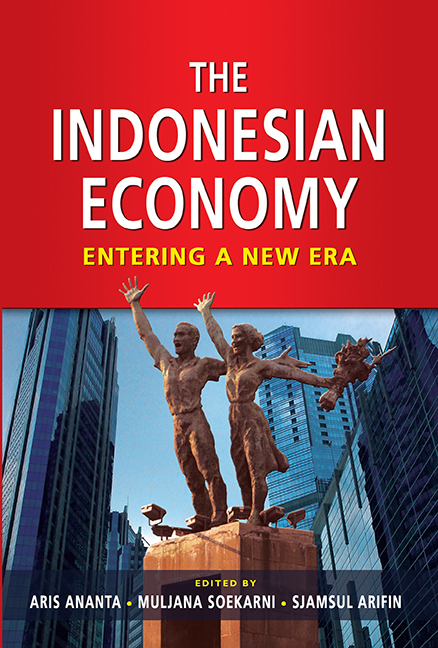Book contents
- Frontmatter
- Contents
- List of Tables
- List of Figures
- Message from the Deputy Governor of Bank Indonesia
- Message from the Director of the Institute of Southeast Asian Studies
- Foreword
- Preface
- Contributors
- PART I INTRODUCTION
- PART II MONETARY AND FISCAL POLICIES
- PART III DOMESTIC ECONOMY
- PART IV SEARCH FOR NEW PARADIGMS
- 10 Embracing ASEAN Economic Integration 2015: A Quest for an ASEAN Business Cycle from Indonesia's Point of View
- 11 Governance and Economic Performance
- 12 A Search for a World Development Paradigm: With Specific Recommendations for Indonesia
- Index
11 - Governance and Economic Performance
from PART IV - SEARCH FOR NEW PARADIGMS
Published online by Cambridge University Press: 21 October 2015
- Frontmatter
- Contents
- List of Tables
- List of Figures
- Message from the Deputy Governor of Bank Indonesia
- Message from the Director of the Institute of Southeast Asian Studies
- Foreword
- Preface
- Contributors
- PART I INTRODUCTION
- PART II MONETARY AND FISCAL POLICIES
- PART III DOMESTIC ECONOMY
- PART IV SEARCH FOR NEW PARADIGMS
- 10 Embracing ASEAN Economic Integration 2015: A Quest for an ASEAN Business Cycle from Indonesia's Point of View
- 11 Governance and Economic Performance
- 12 A Search for a World Development Paradigm: With Specific Recommendations for Indonesia
- Index
Summary
INTRODUCTION
With the ending of the Cold War, governance has received increasing attention, which has in turn changed the global geopolitical game. Since then, official donor countries and creditors have started to impose sound macroeconomic policies, a healthy regulatory environment, more transparent and accountable public institutions, and the protection of property and investors’ rights. These factors have become essential prerequisites for attracting foreign direct investment and accessing financial markets on reasonable terms. Another factor underlying the rising importance of governance is the spread of democratic practices in the late 1980s all the way through the decade of 1990s. On the other hand, the absence of the rule of law and accountable system of governance led to rent seeking and corruption (Abed and Gupta 2002).
The term “governance” has numerous definitions as well as interpretations. Peters (2008) suggested that governance refers to the provision of some means of collective steering for the economy and society. He also recognized that there are various interpretations as to what governance really refers to. To reflect the different characteristics, various adjectives have been added to the basic concept of governance, such as: network governance, focusing on the capacity of networks to deliver governance; new governance network, meaning ability to cope with complexity and respond to social changes; good governance, denoting the reduction of corruption and the creation of greater accountability, commonly used by international donors; and finally, quality of governance, mainly used by scholars to explain the characteristics of a political system in its efforts to promote good living standards.
The World Bank (1992) defined governance as the exercise of economic, political, and administrative authority in managing a country's affairs at all levels incorporating the aspects of economic governance (decision-making processes that affect a country's economic activities), political governance (the process of decision-making to formulate policies), and administrative governance (the system of policy implementation). Moreover, it considers participation, rule of law, transparency, responsiveness (to stakeholders), equity, effectiveness, and efficiency as major components of governance.
Kaufmann, Kraay, and Mastrussi (2009) defined governance as the traditions and institutions by which the authority in a country is exercised. This includes how governments are elected, supervised, and replaced; the government's capacity to formulate and implement sound policies; and the observance of civil rights as well as the quality of the institutions in managing the economy and social interactions.
- Type
- Chapter
- Information
- The Indonesian EconomyEntering a New Era, pp. 345 - 374Publisher: ISEAS–Yusof Ishak InstitutePrint publication year: 2011

